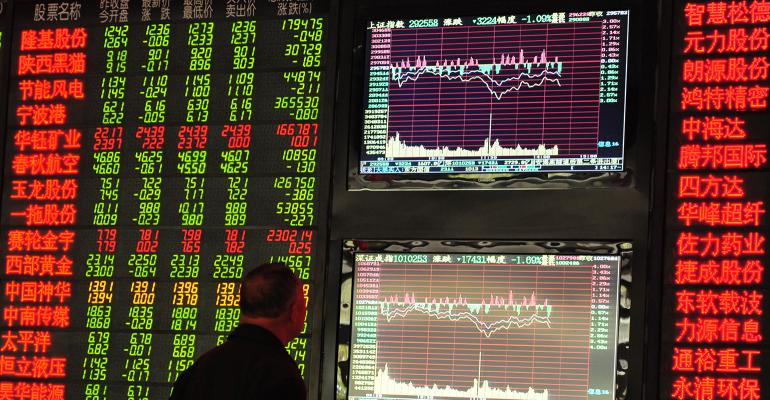HONG KONG/SHANGHAI, Aug 18 (Reuters) - Tired of spending hours at her Beijing bank discussing her finances and a myriad of investment options with her account manager, Lauren Ma turned to Lingji, a phone app that pre-selects a range of assets and trades for her automatically.
Ma recently topped up her initial June investment of 100,000 yuan ($15,000) with a further 200,000 yuan, encouraged by the convenience and healthy returns.
Chinese retail investors like Ma are flocking to automated advice and trading programs, so-called robo-advisors, looking for affordable access to advice to improve returns at a time of low interest rates, weak domestic equity markets and pressure on real estate prices.
Although still in its infancy, assets under management (AUM) of robo-advisors in China are expected to balloon to 6 trillion yuan ($905 billion) by 2020, according to China Merchants Securities estimates, underscoring the potential for growth in an industry that was non-existent until recently.
That would still be less than half the $2.2 trillion consulting firm A.T. Kearney estimates for the AUM of robo-advisors in 2020 in the United States, where services launched several years ahead of China.
"In China, the middle class is suffering because there aren't that many investment options," said Ma, 30, who does business development in China for film studio Lions Gate Entertainment Corp and has earned 3.5 percent on her investments. "From that point of view, it's good for many people, not just young people who are always on the phone."
Proponents argue robo-advisors could also bring some much-needed diversification and discipline to China's retail investor market by providing advice and access to a wide range of investments at a lower cost than traditional wealth managers.
Extreme volatility in everything from stocks to property and commodity futures in recent years have been blamed on a lack of sophistication and herd mentality among retail investors, who have been hurt by painful corrections.
Eggs in Different Baskets
Avoiding advisory fees and sticking with what they know, many Chinese retail investors have traditionally focused their investments on a single asset class, such as property or stocks.
That often produced healthy returns as the economy grew 10 percent or more a year. But China's slowdown, volatile stock markets and weakening currency have all played a big role in bolstering demand for robo-advisory and a more diversified, customised approach.
"All these (factors) were a turning trend for people to start to think maybe it's not right to invest in just one asset anymore, and start to put the eggs into different baskets," said Zheng Yudong, a former banker with Standard Chartered and Citigroup who is the CEO of Xuanji, which developed the systems used by Lingji.
Typically, investors will be asked a series of questions about their investment goals and risk tolerance, then the software will select the portfolio of exchange traded funds (ETF) or other assets to invest.
Robo-advisory companies like Hong Kong's 8 Securities and Germany's Ginmon Gmbh charge less than 1 percent of a client's assets under management, versus fees as high as 5 percent charged by wealth managers.
They also give Chinese investors the option to invest in overseas markets, increasing their appeal to people concerned about a weakening of the yuan.
8 Securities' clients can buy U.S. ETFs, while Lingji users can tap U.S. markets through mutual funds offered by another company under China's Qualified Domestic Institutional Investor (QDII) scheme.
Beijing-based Xuanji is now also targeting large Chinese asset managers with its robo-advisory service, so they can deploy automated advice tools without having to create their own, Zheng said. The company, part of PINTEC Group that includes peer-to-peer lender Jimubox, will unveil its first agreement with an asset manager this week, he added.
Hurdles Loom
The nascent industry for automated investment advice in China does face challenges, including tight government controls on capital flows and an uncertain regulatory environment that could lead to a government crackdown similar to that imposed on peer-to-peer lenders recently.
"The potential size of the market for robo-advisors is large, the rate of growth is relatively fast, but the actual assets under management we feel is still very low," said Zennon Kapron, founder of Shanghai-based financial industry research firm Kapronasia.
Still, the rapid growth is a big draw-card for the industry.
In the United States, traditional fund management firms companies including BlackRock Inc, Fidelity Investments, Charles Schwab Corp and The Vanguard Group have all taken notice of the advances from robo-advisors and launched their own services or acquired start-ups.
Analysts expect the trend will be similar in China and the rest of Asia.
"Wealth management has been very good at protecting itself. Fees are still quite high and access is not what it could be," said Mathias Helleu, executive chairman and co-founder of 8 Securities. "The rise of robo investing is quite important in that sense." ($1 = 6.6324 Chinese yuan renminbi) (Editing by Lincoln Feast)






